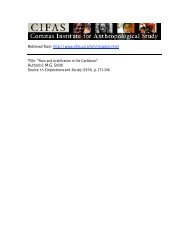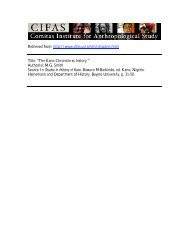e - CIFAS
e - CIFAS
e - CIFAS
You also want an ePaper? Increase the reach of your titles
YUMPU automatically turns print PDFs into web optimized ePapers that Google loves.
10 GOVERNMENT IN ZAZZAU<br />
period of time and with sufficient accuracy the development of an<br />
institutional complex within a single society. The criticisms ofunreliability<br />
which have been leveUed at unrecorded historical data<br />
are especially pertment to the present study, since data on past<br />
political relations and administrative systems must be verba~ and<br />
verbalizations about political administration form a large part of<br />
the very stuff and technique of that activity. As a rule, general<br />
statements about political and administrativepractice and organization<br />
can hardly be regarded as satisfactory evidence in the absence<br />
of fairly detailed and systematic checks. This means that it is inadmissible<br />
to use traditions which do not check one another<br />
systematically or in sufficient detail even though they may be<br />
collected from several sources; likewise, traditions which correspond<br />
systematically and in detail but which are drawn from<br />
related sources, cannot provide an acceptable basis for sound re~<br />
constructions. In the present case, however, a combination of<br />
happy circumstances has by good fortune greatly reduced these<br />
difficulties.<br />
On the Fulani invasion of Zaria in 1804, the Habe ruler fled<br />
southward to Zuba, and, as mentioned above, he and his descend~<br />
ants there established a state known as Abuja, from which they<br />
successfully resisted the Fulani until the British arrived. In two<br />
recent publications, Mallam Hassan, then Barkin Ruwa of Ahuja,<br />
and himself a younger brotherofM. Suleimanu Barau, the present<br />
Emir of Abuja, has given an account of the customs and history<br />
ofthat kingdom flOm Makau's reign down to the year II}44, when<br />
the present Emir succeeded to the throne and suggested that these<br />
traditions should be recorded. l M. Hassan's account, interesting<br />
and valuable in itself, is especiaUy useful in that it extends our<br />
historical knowledge of the sarauta institutions of Zazzau, and<br />
hence of the system of government of which they were the key<br />
institutions, backwards for over 150 years, thereby enabling us to<br />
study changes to which these institutions ofgovernment have been<br />
subject in Zaria since the Fulani conquest.<br />
1 M. HIl8lIUl, Sarkin Ruwa, Ahuja. and Shu'aibu, Mulraddmrio Makamnta,<br />
Bida, Makau, Sarkin Za:uau na Hah (hereafter referred to 81 (I), and TariM<br />
da Al'adtm H~ na Ahuja (hereafter referred to M (:a» pubJishecl by Gaekiya<br />
Corporation. Zaria, 1952. A tranalation of both boob by Frank Heath has since<br />
been published by the Ibadan University Preet for the Abu,ia Native Ad~<br />
minUtration, under thetitle, A ChrotticU6f Abuja. 1952. Mr. Heath'. translation<br />
is sometimes too free for our Purpo8e and m-.y be compared with that of Appendir<br />
A; d. Heath, op. cit., pp. 7z-&4.<br />
INTRODUCTION<br />
Such use of M. Hassan's material involves certain assumptions<br />
.ch must be made explicit at the outset. Our first assumption is<br />
at M. Hassan's account is substantially correct for Abuja as far<br />
it goes. Its author's membership of the royal family and high<br />
cia! rank suggest that all relevant information on the affairs and<br />
ry of the state ha5 hem available to him freely over a period<br />
::-0£ many years, while the fact that the compilation was undertaken<br />
';,.t the Emir of Abuja's request suggests that all reliable sources of<br />
",local infonnation wele also fleely aCce55ible. It is thus of special<br />
'interest that, whatever may be the bias in the narrative of past<br />
'wars, the account of political and administrative customs and<br />
institutions which M. Hassan gives is almost wholly free from<br />
value tenus and assumptioI15 as may be scm by examining the<br />
appendix. It is perhaps of even greater importance to us that M.<br />
Hassan has simply presented a list of the offices of the traditional<br />
Abuja govemmmt, and has detailed their principal characteristics<br />
without indulging in any speculations or recorurtruction himself<br />
(see Appendix A).<br />
Our second assumption is that the Habe of Abuja continued to<br />
adhere to the institutions which were typical of Zazzau before the<br />
Fulani conquest; in effect, thiB means that we can treat M. Hassan's<br />
description of nineteenth~centurygovernment organizationat<br />
Ahuja as a provisiOnal account of the government of Habe Zazzau<br />
in the previous century. No general categorical statement of<br />
equation is made by M. HaSfl3ll in the publications referred to, and<br />
it is clear from a critical study that his compilation was made with~<br />
out reference to these problems. None the less, these accounts<br />
contain numerous references to customs which obtained both at<br />
Zaria and Abuja, while certain diffelences were also noted. Such<br />
references suggest that, unless otherwise qualified, the institutioI15<br />
described are regarded by the author as common to both historical<br />
periods, and this view is borne out by a letter to the present writer<br />
after the first draft ofthis study was completed, inwhich M. Hassan<br />
eays simply that 'nothing was changed in the political system of<br />
the Habe when they moved to Abuja'.<br />
It is reasonable to assume that the Habe who fled from Zaria<br />
to Abuja continued to practise their traditional institutions as far<br />
as the new conditions permitted, if only because the unity 80<br />
essential to the suCt:eSS of their continued resistance to the Fulani<br />
would probably have required such conservatism in their govern~<br />
II





